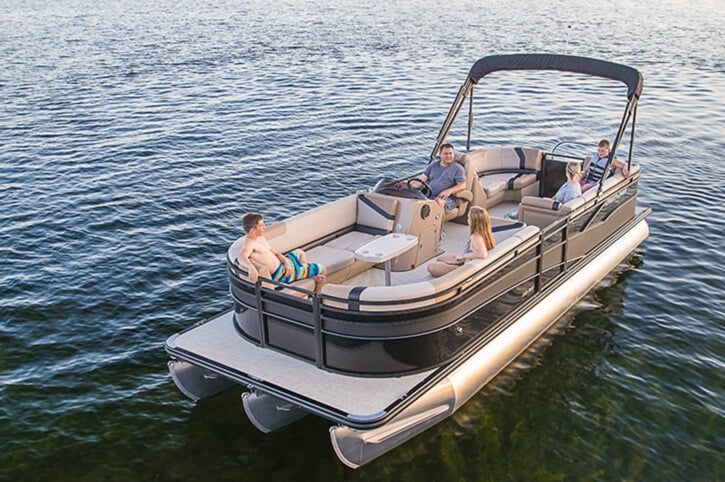How Much Does a 24 Ft Boat Weigh?
When deciding the boat type that’s right for you, weight might be one of the last things on your mind; but boat weight is one of the most important considerations. To keep everyone safe while boating, and especially if you’re going to tow your boat behind your vehicle, you’ll need to know the dry weight, fuel and gear weight, trailer weight and towing weight.
I’ve researched for you on how much a 24 ft boat weighs. Everything you need to know is in here.
How Much Does a 24 Ft Boat Weigh?
How much does a 24 ft boat weigh? Depending on the boat type, from 2,500 lbs. to 4,900 lbs. without a trailer.
There are a lot of variables that go into an accurate answer to the question above, including boat type, boat manufacturer, and engine options; for instance, a fiberglass boat weighs more than an aluminum boat and a bass boat will weigh less than a catamaran. We are going to look at a few boat types to give you the best answer the internet has to offer.
We’ll cover dry weight (hull, engines, and all components that are part of the boat (fuel lines, hydraulics, electronics, etc.)), gear and fuel weight, trailer weight, and things to consider when towing. By the end of the article, you’ll be a pro.
Tideline 235 Hybrid – Catamaran

The Tideline 235 Hybrid is a great cross between a classic bay boat and a more capable offshore boat. This boat offers a twin-hull design with a shallow draft so you can get into skinny water in the bay, ample room on the interior to move around, twin engines, a large fuel capacity, and fish boxes that are insulated, making it a truly capable boat both inshore and offshore. The 235 Hybrid comes equipped with twin engines from the factory with a max horsepower rating of 400 HP.
Let’s breakdown the weight for this boat:
- Dry Weight – 4,900 lbs., including engines (larger or smaller engine options will affect the weight).
- Gear and Fuel Weight – approx. 1,700 lbs. We came to this number by adding the weight of fuel, batteries, ice, and fish in the insulated fish boxes, and about 300 lbs. of additional gear (fishing poles, tackle boxes, life jackets, paddles, etc.). The gear and fuel weight can change depending on how much fuel you are carrying if the fish boxes are full or empty, and how much other gear you have onboard.
- Trailer Weight – approx. 1,130 lbs. Trailer weight, like gear and fuel weight, will vary greatly depending on the trailer style (e.g. single axle or tandem axle), the material you choose and if you have trailer brakes or other additions to the trailer. Since the Tideline is on the heavier side, an aluminum trailer will help keep the GTW down.
- GTW (Gross Trailer Weight) – 7,730 lbs. For towing weight purposes, this is the number you want to pay the most attention to. Later, we’ll talk about why GWT is important and a few guidelines for safely towing your boat.
Pathfinder 2400 TRS – Center Console
The Pathfinder 2400 TRS is one of the go-to center console bay boats for anglers because of the focus on fishability and ease of use Some of the features include walk-around gunwales, rod storage for rods up to 9.5′, and storage that can double as fish boxes. This boat has a 73-gallon fuel capacity a draft of only 12”, and the ability to mount up to a 300 HP motor. These boats are also highly customizable so you can create a fishing machine that fits your needs exactly.
The weight break down:
- Dry Weight – 3,300 lbs. (with Yamaha F300 outboard). If you choose a smaller engine option, the dry weight will drop, and if you add any other options, the dry weight could increase.
- Gear and Fuel Weight – approx. 1,000 lbs. We came to this number by adding the weight of the fuel, the weight of the batteries, and about 300 lbs. for additional gear (fishing poles, tackle, paddle, etc.) This number can vary greatly depending on what you like to keep on your boat. Including passengers, the 2400 TRS has a max weight capacity of 2,000 lbs.
- Trailer Weight – approx. 1,400 lbs. The weight cited here is for a tandem axle galvanized trailer that is large enough to fit the 24 ft bay boat. A galvanized trailer will help protect against corrosion as the trailer is pulled in and out of the saltwater.
- GTW (Gross Trailer Weight) – 5,550 lbs. GWT may also be referred to as towing weight.
Crestline 240 Rally – Pontoon
For a day of family fun on the water, a pontoon boat has some of the best versatility a boat can have. There is truly something for everyone – shaded area with large wrap around seating for those who don’t want too much sun, open deck area for the sunbathers and fishermen, plenty of access to the water if you want to jump in, and, depending on the pontoon and how it is powered, the ability to pull a tube or skier. The Crestline 240 Rally offers even more versatility in the variety of available seating configurations. Pontoons are also one of the lightest ways to get onto the water. Because they use mainly aluminum construction and hollow pontoons, weight is kept to a minimum.
Here’s the breakdown:
- Dry Weight – between 2,705 lbs. and 3,400 lbs. depending on configuration and number of pontoons (for our calculations, we’ll assume the base configuration and two pontoons instead of three). One of the great things about a pontoon boat is the ability to customize the boat to fit your specific needs. What this means, though, is the weight can change dramatically. The dry weight of this pontoon boat is based on its basic seating configuration and a 9.9 HP outboard. If you upgraded to a motor that would power the boat more efficiently (e.g. 115 HP), the dry weight would increase by 255 lbs. An increase in the weight of the motor will also directly affect the maximum weight capacity for the boat (i.e. if the dry weight increases by 255 lbs. because of a larger motor, the maximum weight capacity would decrease by 255 lbs.).
- Gear and Fuel Weight – approx. 1,000 lbs. Once again, we came to this number by adding the weight of the fuel, batteries, and any other gear you might want on board (fishing poles, tackle, life jackets, paddle, etc.). This number will change depending on what you like to have on your boat.
- Trailer Weight – 1,160 lbs. Because pontoon boats are a little lighter than the other boats we’ve talked about, you can use a galvanized trailer and it will still be a little lighter than a galvanized trailer for a heavier boat.
- GTW (Gross Trailer Weight) – 5,120 lbs.
Tips on Boat Towing
We have covered a lot of ground on the weight of a variety of boat types, now let’s look at boat towing. Gross Trailer Weight or GTW (total weight of the trailer and anything on the trailer) is the weight assigned by the manufacturer of your vehicle that tells you the maximum amount that your vehicle is capable of safely towing. Staying well below the maximum is advised, just to be on the safe side. If a trailer is too heavy, or improperly loaded, you can easily lose control of the vehicle. Below is a chart showing vehicle manufacturer weight ratings and what is included in the calculations. This is not meant to be a comprehensive list of the actual weight ratings of various vehicles, rather a way to introduce you to the terms and acronyms you might come across:
| GTW | Gross Trailer Weight | Trailer + gear |
| GVWR | Gross Vehicle Weight Rating | Vehicle + people and gear |
| GCWR | Gross Combined Weight Rating | Vehicle + people and gear + trailer and gear |
| GAWR | Gross Axle Weight Rating | Distribution over each axle of vehicle + people and gear + trailer and gear |
A few additional towing tips:
- At the boat ramp, before pulling the boat out of the water, remember to attach the winch strap to the eye on the hull of the boat. This will prevent the boat from coming off while driving.
- Strap down the back of the boat to the trailer to prevent the boat from bouncing.
- If you are loading gear inside the boat while it’s being towed, put 60% of the weight in front of the axle, closest to the tow vehicle.
- Accelerate slowly and leave enough room between you and the car in front of you so you can safely stop.
- Make wide turns to avoid hitting anything that may be beside you.
A Few Takeaways
Boat weight, even when boats are the same length, can vary depending on the style of boat. What we’ve seen here is that the pontoon is the lightest, followed by the center console, with the catamaran being the heaviest. If you are looking to buy a boat, weight is important, but it’s also important to look at the functionality you need and buy a boat that makes sense for you. Keep in mind, the weight of the boat you choose will directly impact the type of vehicle you need to tow your boat.
We’ve talked a lot about boat weight with a focus on weight for towing purposes, we do need to mention, also, the importance of understanding and sticking to the Maximum Capacity sticker that is posted in every boat. Boats float because of displacement (the amount of water that’s moved out of the way when a boat sits in the water) and only so much can be displaced before the boat begins to sit too low in the water. The worst-case scenario is water can come over the sides, potentially leading to the boat capsizing.
As always, the most important part of owning a boat is to have a good time on the water with your family and friends!

